As Assistant Strength & Conditioning Coach at Ohio Univeristy, Zac Brouillette is an experienced coaching professional who plays an important role in aiding the implementation of the University’s strength and conditioning program.
Formerly a Graduate Assistant at Iowa State, Brouillette is now tasked with supporting the design and delivery of a year round S&C program for the Ohio Bobcats football team, as well as directing the speed, strength, and conditioning programs for the men’s basketball, softball and baseball programs.
Coach Brouillette was recently onsite at Altis attending the latest Apprentice Coach Program, so following swiftly on from his recent stint in Phoenix, we took the opportunity to catch up and talk about his views on coaching, strength & conditioning, and Altis.
ES: Zac – thanks for joining us. Your experience in S&C must have given you some unique insights into how best the role of the strength coach fits within an integrated support team, so let’s start with this – what in your opinion, is the role of a strength coach within such a coaching team?
ZB: I think the role of the strength coach is often misunderstood. Obviously we are the ones responsible for the strength training of athletes, but many times we are put into roles far beyond barbells and dumbbells. We often serve as the team nutritionist, sports psychologist, and are the ones responsible for creating team chemistry. In the college setting, the strength and conditioning coach usually spends more time with the athletes than any sport coach, thus making our role rather significant. The strength coach often creates the personality and demeanor of the team through the off-season workouts and the daily environment created in the training facility.
ES: So, as a strength coach how do you ensure what you prescribe is not having an adverse effect on sports specific skills?
ZB: The biggest thing I rely on is athlete and coach feedback. I ask our athletes on a daily basis how things are going at practice, how they feel physically, what areas are sore on their body, how they are sleeping, etc. I ask very similar questions to the sport coaches and see if they are noticing any trends (i.e. injury, fatigue, high/low energy, etc) with their athletes. At the college level, strength training is an accessory to the sport and many strength coaches don’t acknowledge that. I regularly have to modify or eliminate things from our workout script based on the feedback I get from the athletes and coaches. For example, if my baseball guys had a heavy emphasis on base running at practice I have to be smart enough to realize their lower body is going to be in a compromised state and have to adapt my training plan accordingly. Far too often Coaches get glued to their workout card and force athletes to complete everything prescribed in a workout, not taking into account what stressors the body may have been exposed to at sport practice. If you do not acknowledge these things, you are well on your way to injuring athletes, which goes against most strength coaches’ top priority of “Decreasing Risk of Injury”.
ES: Great insights. So moving onto your time as an athlete. You’ve explained that Coach Pfaff had a strong influence on your training program as a thrower in college whilst working with Coach Dagata – can you tell us about this?
ZB: My college career was kind of a unique experience in that I started out as a football player and after 3 seasons traded in my football cleats for throwing shoes, at which time my training style also drastically changed. Prior to joining Coach Dagata I was used to year round heavy lifting and the typical football running (gassers, 300 yd shuttles, etc). Once I joined the track world I was introduced to many of Coach Pfaff’s training ideas on things such as multi-throws, multi-jumps, rudiment jump battery, general strength and ancillary circuits, and a structured year round training plan that was thoroughly explained to us as athletes. As an athlete who started lifting weights at age 14, my gains to be made in the weight room were minimal once I got to college, but I found Coach Dagata’s training method of utilizing sprints, jumps, and throws, along with the weight room training, helped me increase my athleticism and power output significantly over our 2 years together.
ES: Moving back to your role as a coach – you’ve worked with multiple sports and have written some insightful articles on Dan’s training methods in your blog; what are the stand out themes taken from Coach Pfaff’s work that you have you applied to your own programming?
ZB: One of the biggest things I have picked up from Coach Pfaff is not just what goes into designing and programming a training session, but how to read athletes movement and how to utilize the feedback you get from athlete’s to prescribe specific therapy and utilize plan B training modalities. Another significant training tool I have picked up from Coach Pfaff is learning and utilizing the 5 bi-motor qualities (Speed, Strength, Stamina, Skill, and Suppleness) in my programming. Many strength coaches only train 1-2 of these qualities and I have found making all 5 of these the foundational emphasis’ of my programming has lead to more well rounded and less injured athletes.
As far as things Coach Pfaff does that I use in my specific setting; I use multi throws, rudiment jumping battery, general strength circuits, and multi-jumps regularly in our off-season training programs. I have found many college athletes are very immature from a training standpoint in these activities and have demonstrated they can make improvements in overall athleticism when these activities are programmed and implemented correctly.

Zac Brouillette
ES: And how about the way in which you coach and deliver this information to your athletes?
ZB: I try to establish a two way trust with my athletes. This helps us in our training as well as our injury management and describing and reporting injuries. In the college setting we are constantly preaching toughness to athletes, which has created a double edged sword in that athlete’s are playing through pain, but are also hiding injuries that can be detrimental to their performance. Once an athlete realizes you are trying to help them when they have an injury and not looking to kill them with some alternative punishment type workout, you see the quality of athlete’s injury reporting improve, which leads to more efficient program design and hopefully increased sports performance.
ES: Some great insights. So, in terms of Altis a whole, how would you describe the training & coaching methodology here based upon what you experienced during the ACP week?
ZB: It is training of athletes at the highest level, without a doubt. The most impressive thing to me is how much data the coaches can gather by simply watching an athlete move through the warm up, drill work, and event work. Altis has some of the top coaches in the world working at their facility and after talking with some of the athletes who are training on site, they can’t believe how much feedback they get from the coaches and what it has done to help improve their performances.
ES: You are a strong proponent of the importance of maintaining and building athlete health. What did you take away from the ACP in terms of methods and modalities implemented to maintain and increase athlete health?
ZB: I think more than anything the ACP helped me confirm that I am on the right path as far as how I am training my athletes utilizing many of Coach Pfaff’s training concepts. I have studied Coach Pfaff’s methods very heavily in the past year so I had a pretty good idea of what he does as far as training ideas and drills go. One of the things I thought was very beneficial was just the openness of the training sessions. All of the coaches are open to any questions and are more than willing to explain anything they do and encourage you to jump in with the athlete’s during things like the warm-up and drill work. Also, the afternoon talks with Coach Pfaff are outstanding. It is simply 2 hours of Q&A with one of the top minds in track and field and sports performance world. No questions are off-limits and Coach Pfaff thoroughly answers every question.
“The afternoon talks with Coach Pfaff are outstanding”
Zac Brouillette
EA: As an experienced coach, athlete and speaker, you have attended multiple courses and conferences; how does the ACP compare in terms of structure and content?
ZB: The ACP environment is much different than the typical coaching clinic. You are surrounded by elite coaches and athletes in a real time training environment. Coaches aren’t standing on a stage telling you what they do; you are watching firsthand what they do and how they interact with their athletes. I think just being in that environment helps you understand concepts and drills much better than watching them on a PowerPoint presentation. You pick up coaching cues and see how top level coaches and athletes interact during a training session.
ES: Who would you recommend attends the ACP, and what will the ACP provide in terms of insights and experience for these coaches?
ZB: I think the ACP is good for any coach that deals with preparing athletes for elite performances. Obviously track and field coaches would find the most benefit, but strength and conditioning coaches wouldn’t be far behind when talking about knowledge that can be gained from the ACP experience. Being able to interact with elite coaches and elite athletes for a week is beneficial to any coach. Seeing everything from therapy methods to drill specific coaching cue’s, the ACP experience helps a coach understand what elite performance is truly about.
ES: Zac – some fascinating insights. Thanks for your time.
Zac Brouillette is on Twitter and also has a blog which can be found here.

